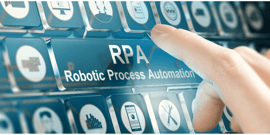BP3 GLOBAL-SERVICE
Invisible Robots with Craig Le Clair of Forrester Research
Forrester analyst, Craig LeClair, joined us after his keynote speech to talk about "Invisible Robots in the Quiet of the Night," his new book. If you're interested in purchasing a copy, Craig's book is available now on Amazon.
Krista White: Thanks, Craig, for sitting down with us today. Today, we're going to talk about Invisible Robots in the Quiet of the Night, which is your new book. Let's start with you summarizing this book for us. What is this all about?
Craig Le Clair: Well, the most common question I get asked is, why invisible robots? It's pretty simple, really. The robots that are grabbing a lot of the media attention are not going to have the effect on the workforce and our lives as the ones you don't see. The ones you don't see operate in obscure data centers. They may be a robotic process automation bot built. It might be a chat bot that's now handling customers directly. It may be a machine learning algorithm that's operating in some data center, that's making a decision that a human once was. When we looked at the future of work and we looked at the trends in automation, we found that it's very difficult to program human agility into these physical robots and to move into factory work at the great rate, to move into a taking traditional jobs, even self-driving cars and trucks I think, have been overstated. We saw that the real action is in the software robots, which is why we're having this conference here. Right?
Krista White: Yeah. People talk to you a lot about Robotic Process Automation. It's one of the areas that you cover at Forrester. What is something that people ask you all the time, and what's the answer that you give?
Craig Le Clair: Well, there are a lot of questions, but probably the biggest one is, is this a flash in the pan? Is this a market that, like many software markets, has a period of great hype, and then a period of not being that productive, and then a period of being dismissed? Now, all software markets have a life cycle. The way I answer that is that it depends on a couple things. It's clearly, if you saw my presentation today, which you didn't, because this is a video, but I talk about these rule of five processes, where you have a small set of decisions, less than five, a small set of apps involved, and 500 clicks or less, that really provide a very simple process that a human might be doing that you can build a bot with RPA to do. That's what's driving the market right now, these very simple processes, and companies have thousands of these, use cases all over the place.
But at some point, you're going to run out of those rule of five processes, and to progress and to reach the hype that's surrounding this category, it needs to combine with analytics in a much bigger way. There's no inherent learning capability in RPA. You have to use the orchestration capability that's fundamental to these platforms to go enlist these machine learning algorithm, to enlist other invisible robots that can help with things. The real answer is whether the RPA platforms will embed enough of this intelligent technology in their platforms to really progress a stronger and smarter digital workers and therefore achieve the value that is being associated with it, or will it just be doing the kind of rule five processes and then actually some other AI technology will be the ones in control and making the decisions? I am a believer that RPA will continue to progress along intelligent automation paths, and it will be a very significant market for a long time to come.
Krista White: Awesome. Well, thank you for sitting down with us and joining us here. You can find Craig's talk at Driven on our channel, and you can find more videos like this here. Thanks, Craig. You can find his book on Amazon right now.
Craig Le Clair: Thank you so much. I really appreciate the support.


